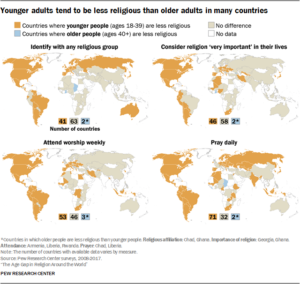Looks like you don’t have to be American or European to give up on religion.
And the same is especially true for young adults, who are becoming “nones” around the planet just as they are in the U.S., according to new data published by the Pew Research Center.
So, if nothing else, church and denominational leaders in the states can take comfort knowing that they’re not alone in the struggle against declining memberships and affiliation.
In a June 13 study titled “The Age Gap in Religion Around the World,” Pew found that young adults globally tend to be less religious than older people, and that “the opposite is rarely true.”
The expansive report delves into a range of factors that predict religiosity. Those include income levels, life span, geographic region and social standing.
 It starts off by recapping what American religious leaders have come to know all too well: that congregations are getting older, and young people are increasingly unlikely to identify with a religion, believe in God or participate in religious practices.
It starts off by recapping what American religious leaders have come to know all too well: that congregations are getting older, and young people are increasingly unlikely to identify with a religion, believe in God or participate in religious practices.
“But this is not solely an American phenomenon,” Pew said in the report.
“Lower religious observance among younger adults is common around the world,” the research group said.
The age gap in religions is larger in some places than in others. But on average, adults 40 and younger are less inclined to view religion as “very important.” And that’s the case in nations such as Canada, Switzerland, Iran and Nigeria, Pew reported.
Still, there are exceptions.
“While this pattern is widespread, it is not universal,” the report states. “In many countries, there is no statistically significant difference in levels of religious observance between younger and older adults. In the places where there is a difference, however, it is almost always in the direction of younger adults being less religious than their elders.”
Pew identified 41 nations where people 18 to 39 years old “are significantly less likely than their elders to have a religious affiliation.”
Those include Canada, the U.S., Mexico and most of South America. It also includes much of Europe. Chad and Ghana are the only countries where Pew found younger adults to be more religious than their elders.
What’s true about attitudes also holds for behaviors.
“Younger adults are less likely to say they pray daily,” Pew said. Only in Chad and Liberia are young adults likely to pray twice a day.
“And adults under 40 are less likely to attend religious services on a weekly basis in 53 of 102 countries,” Pew said in the report. The “opposite is true in just three countries (Armenia, Liberia and Rwanda).”
The gaps between generations are small in many countries. The overall average is 5 percentage points for affiliation, 6 percentage points for worship attendance and 9 percentage points for prayer, Pew said.
But there are some countries where the differences are much wider, and the U.S. is one of them.
“There are gulfs of at least 10 percentage points between the shares of older and younger adults who identify with a religious group in more than two dozen countries – mostly with predominantly Christian populations in Europe and the Americas,” Pew researchers found.
American adults under 40 trail their elders by 17 percentage points in identifying with a religion. The rift is 28 percentage points in Canada, 24 points in South Korea, 18 points in Uruguay and 17 points in Finland.


